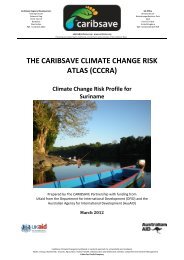You also want an ePaper? Increase the reach of your titles
YUMPU automatically turns print PDFs into web optimized ePapers that Google loves.
Reviewing <strong>and</strong> considering the feasibility of renewable energy generation targets binding on<br />
utilities.<br />
Changing building <strong>and</strong> planning regulations to support micro-generation <strong>and</strong> water efficiency.<br />
Clarifying cost structures <strong>and</strong> incentives for existing suppliers to invest in renewable energy.<br />
Since traditional tourism management is primarily concerned with revenue management, to facilitate the<br />
transformation of tourism towards becoming climatically sustainable will necessitate concerted efforts in<br />
mitigation even to the extent of aiming to achieve carbon neutrality. Emissions <strong>and</strong> revenue also need to<br />
be integrated <strong>and</strong> energy intensities need to be linked to profits. While this would dem<strong>and</strong> a rather radical<br />
change from current business models in tourism, all aspects of a low-carbon tourism system are principally<br />
embraced by business organisations. An indicator in this regard can be eco-efficiencies, i.e. the amount of<br />
emissions caused by each visitor to generate one unit of revenue. However, this kind of analysis is generally<br />
not as yet possible for Caribbean isl<strong>and</strong>s due to the lack of data on tourist expenditure by country <strong>and</strong><br />
tourist type (e.g. families, singles, wealthy-healthy-older-people, visiting friends <strong>and</strong> relatives, etc.).<br />
In consideration of the renewable energy <strong>and</strong> energy efficiency potential, the Climate Change Green Paper<br />
supports the need to develop an Energy Policy as an important adaptation strategy <strong>and</strong> concludes that<br />
mitigation measures can provide useful benefits such as energy cost savings <strong>and</strong> recognition as a lowcarbon<br />
destination. Through continued study, monitoring <strong>and</strong> fundraising, the barriers <strong>and</strong> resource<br />
shortages can be sourced for successful implementation of this strategy.<br />
Given the importance of tourism in TCI <strong>and</strong> the potential for sustainable energy initiatives within this<br />
sector, it is vital for governments to engage all tourism actors in adopting a sustainable tourism policy,<br />
because tourism is largely a private sector activity. The Climate Change Green Paper identifies a number of<br />
actions related to energy use in the tourism sector in the short, medium <strong>and</strong> long term. In the short term it<br />
recommends that the tourism industry be encouraged to reduce energy use <strong>and</strong> build eco-friendly designs.<br />
In the medium term it calls for the adoption of greener technologies at tourism facilities <strong>and</strong> in the long<br />
term for attaining Green Globe, Green Key <strong>and</strong> Green Hotel certifications.<br />
Furthermore, governments are involved in creating infrastructure such as airports, roads or railways, <strong>and</strong><br />
they also stimulate tourism development, as exemplified by marketing campaigns. The choices <strong>and</strong><br />
preferences of governments thus create the preconditions for tourism development <strong>and</strong> low-carbon<br />
economies. There is growing consensus that climate policy has a key role to play in the transformation of<br />
tourism towards sustainability, not least because technological innovation <strong>and</strong> behavioural change will<br />
dem<strong>and</strong> strong regulatory environments.<br />
<strong>Turks</strong> <strong>and</strong> <strong>Caicos</strong> have laid the groundwork for future renewable energy <strong>and</strong> energy efficiency initiatives<br />
through the development of the Energy Conservation Policy <strong>and</strong> Implementation Strategy. However, more<br />
effort <strong>and</strong> resources are required to develop the action plan that will lead to meaningful implementation,<br />
particularly with regard to the major energy consuming sectors currently not considered, i.e. shipping <strong>and</strong><br />
aviation.<br />
Water Quality <strong>and</strong> Availability<br />
The Turk Isl<strong>and</strong>s in the southeast receive low annual rainfall of 533 mm; the north west of the group,<br />
including the major isl<strong>and</strong>s of North <strong>Caicos</strong> <strong>and</strong> Providenciales, receive nearly double this amount. This high<br />
variability in rainfall patterns means that drought may be experienced in individual isl<strong>and</strong>s independent of<br />
others. According to the Country Poverty Assessment for the <strong>Turks</strong> <strong>and</strong> <strong>Caicos</strong> Isl<strong>and</strong>s, Gr<strong>and</strong> Turk <strong>and</strong> Salt<br />
Cay are particularly affected by higher water dem<strong>and</strong> in comparison to available water resources. Also, 87%<br />
xxviii





